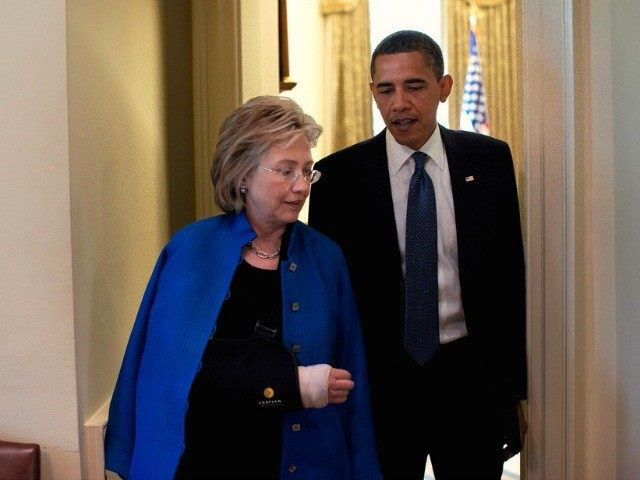No matter how unpopular President Barack Obama and his policies are in 2016, Hillary Clinton may have to embrace them to not turn off black voters. But that may still not be enough for her to enthusiastically turn out the important electorate that makes or breaks Democrats in national elections.
The Associated Press noted that “Clinton has aligned herself with Obama far more than she has disagreed with him,” and her “early moves counter speculation that Clinton would try to separate herself from the president to avoid the impression that having her in the White House would amount to a third Obama term.” After Clinton’s White House meeting with Obama on Monday, for instance, she Tweeted a photo of her and Obama embracing while touting Obamacare.
David Love, an activist who writes for The Grio, wrote after that meeting that though “there is an assumption that since Clinton supported Obama, the black community will now embrace her,” there “are more than a few who didn’t get that memo.” He warned Clinton that “any criticism of Obama could cost her some black voters,” many of whom may still not have gotten over the 2008 campaign in which the Clinton campaign tried to paint Obama as the “black candidate” who could not win.
He writes that “black voters are among the most loyal of the Democratic Party base, and their record high turnout for Obama was an important part of his victory.” In 2012, as Love notes, “Obama won in no small part because blacks turned out for him in record numbers, particularly in swing states like Ohio.”
“However, with a charismatic Obama no longer on the ballot, maintaining the same level of enthusiasm for any other candidate is a challenge,” he continues. “Let’s remember President George W. Bush won re-election in 2004 with just 11% of the black vote. Had Mitt Romney been able to duplicate that number of black votes, he would be president now.”
Love notes that “at this stage of the game, many African-Americans may not be excited about a candidate Hillary Clinton in 2016” and notes that former President Bill Clinton “was relieved of his black card privileges for the remainder of the 2008 election season when he compared Obama’s win in the Palmetto state to that of Jesse Jackson in 2004 and 2008, suggesting that Obama, like Jackson, would not win.”
“The misstep was an affront to many African-Americans,” he says, arguing that Clinton’s time in the Obama administration “does not mean black voters will completely forget the bitter, racially tinged presidential campaign politics of seven years ago.”
Love also suggests that Clinton, who she notes has only given generic statements regarding Ferguson, will have to more vocally support anti-police protestors in places like Ferguson and New York and “prove that she can identify with this frustration and offer ideas for reform in local law enforcement.” He notes that “police shootings of young black men continue to stir outrage in the community” and “this, rather than her email account, is what concerns the black electorate.”
“It is safe to assume that if Clinton wins the Democratic nomination that she will ultimately win the majority black vote in the general election, but that may not be enough,” he concludes. “Clinton can’t assume she’ll inherit that same level of black voter enthusiasm. Support for Barack Obama does not necessarily translate into support for another Democrat. This means Clinton must fight for votes like anyone else: knock on doors, kiss babies, clap off beat at the AME church, and do whatever it takes.”

COMMENTS
Please let us know if you're having issues with commenting.